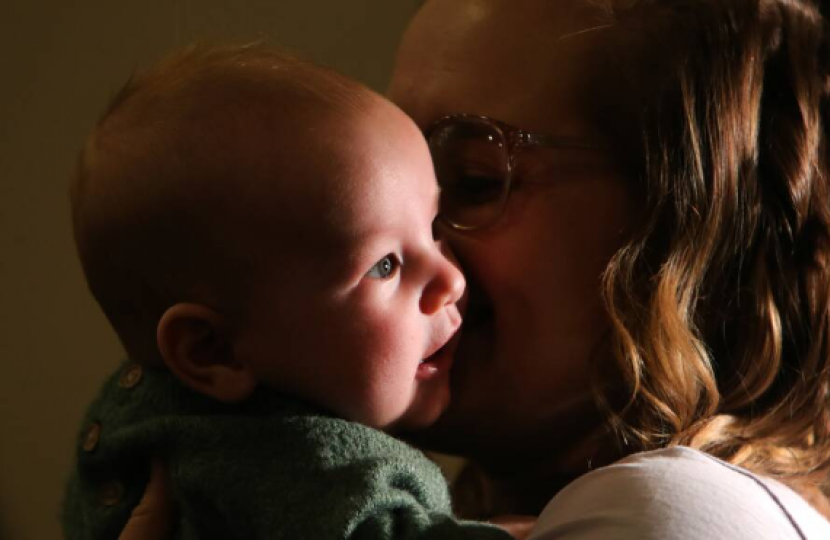
Paul Howell MP Supports Birth Trauma Inquiry Launched in UK Parliament
On 9 January 2024, the All-Party Parliamentary Group (APPG) on birth trauma in the UK Parliament will set up an inquiry to investigate the reasons for traumatic birth and to develop policy recommendations to reduce the rate of birth trauma. Research shows that about 4-5% of women develop post-traumatic stress disorder (PTSD) after giving birth – equivalent to approximately 25,000-30,000 women every year in the UK.
Studies have also found that a much larger number of women – as many as one in three – find some aspects of their birth experience traumatic. Birth Trauma affects 30,000 women across the country every year. 53% of women who experienced birth trauma are less likely to have children in the future and 84% of women who experienced tears during birth, did not receive enough information about birth injuries ahead of time.
The cross-party inquiry is led by Theo Clarke MP and Rosie Duffield MP and aims to find out more about the experiences of women who have been affected by traumatic birth. The inquiry is currently gathering written and oral evidence to inform the policy report which will include practical policy recommendations for the UK Government and will be published in Spring 2024. Seven sessions to hear evidence will run on consecutive Mondays in Parliament between 5 February and 18 March 2024.
The inquiry is inviting written submissions both from parents and from professionals who work in maternity. It is open to everyone in the UK, and we particularly welcome submissions from people from marginalised communities such as those who are racially minoritised, LGBT, economically disadvantaged, homeless, asylum seeking or displaced, care experienced, neurodivergent or facing any other circumstances which means their voice is less likely to be heard.
The inquiry will report in April 2024.
The Inquiry objectives are to:
- Identify common features in maternity care (antenatally, during labour and birth, and postnatally) that contribute to birth trauma.
- Highlight examples of good practice, both in the quality of maternity care and in providing support to women who have had traumatic birth experiences.
- Look at the impact of birth trauma on women’s relationships, ability to bond with their baby and future decision-making (e.g. whether to have another baby, whether to return to work).
- Find out whether current postnatal services to diagnose and treat women’s physical and mental health problems are up to scratch. This would include, for example, looking at whether severe obstetric tears are being diagnosed promptly, whether mental health problems are being identified at the six-to- eight-week check, and whether perinatal mental health teams are accepting and treating women within an appropriate time frame.
- Develop parameters for understanding the possible economic cost of birth trauma, with a view to informing future research.
- Influence government policy by identifying areas where maternity care could be improved to minimise birth trauma and by highlighting ways in which postnatal support can be optimised to meet women’s physical and psychological needs after traumatic birth.
Parliamentary Inquiry into Birth Trauma: Call for Evidence
The closing date for submissions is Tuesday 6 February.
Please read the guidance below on making a submission. There is separate guidance for people submitting a personal story and those submitting their professional opinion.
Please note that by submitting evidence to the inquiry, you consent to our plan for managing your data. There is more information below.
If you have any communication needs which make submitting evidence difficult, please contact us and we will support you with your submission
Written submission guidance for personal stories
At the heart of the inquiry will be the stories of mothers, fathers, trans and non-binary parents, and birthing partners who have experienced or witnessed traumatic birth. We invite you to share your story by making a submission to the inquiry. That will help us understand why people are experiencing birth trauma and the impact it has on them. It will also help us to develop ways of reducing the incidence of birth trauma.
By “birth trauma” we mean any experience related to pregnancy, birth or the immediate postnatal period that left you feeling out of control, threatened, powerless or terrified and this then had a lasting impact on you mentally and/or physically. distressed you and affected your ability to lead a normal life. Perhaps you:
- Felt frightened or out of control during your labour or birth
- Felt a huge sense of loss because your baby was whisked off immediately to special care
- Suffered losses during pregnancy or had a stillborn baby
- Sustained physical injuries such as 3rd or 4th degree tears which have had a lasting impact on you
- Felt intensely distressed at your experience with feeding
No two experiences are the same. If you continued to replay your traumatic experiences or avoided reminders of it, or became especially worried or highly alert, this could be birth trauma. If you felt detached from others or found it incredibly difficult to return to work, this could be birth trauma too.
Note: You can choose to make your submission anonymous if you don’t want to reveal your identity.
Please send your submission as a Word document to [email protected]
Seeking support
Owing to the nature of the evidence being considered by this inquiry, some of the evidence received in submissions and during hearings may include sensitive content that you may find upsetting.
If we have concerns that you could be at serious risk of harm, we will contact you about this in confidence using the details you provide.
If you feel distressed as a result of sharing your story, either in writing or in person, please contact one of the organisations listed below:
Birth Trauma Association peer support: [email protected]
The Birth Trauma Association supports parents who have been affected by traumatic birth. Its email is staffed by peer supporters who have all themselves experienced birth trauma.
Make Birth Better: [email protected] Make Birth Better also supports parents affected by birth trauma as well as professionals affected by vicarious trauma. Their email is staffed by mental health professionals (psychologists and a psychiatrist).
PANDAS helpline: 0808 1961 776
PANDAS supports parents with prenatal or postnatal depression, as well as other perinatal mental health challenges. Its helpline is open Monday to Friday between 10am and 5pm.
Bliss: [email protected]
This offers support for parents and families of premature and sick babies. You can request a video call if you prefer.
MASIC: [email protected] or 0808 1640 8333
MASIC supports people who have experienced injuries as a result of birth.
For help and support please visit their website: Where to seek help - MASIC
National Domestic Abuse Helpline: 0808 2000 247
The helpline is run by the charity Refuge. It is open 24 hours a day, seven days a week and offers free and confidential advice. A translation service is available if English is not your first language.
Samaritans: 116 123 or [email protected]
The Samaritans helpline is open 24 hours a day, seven days a week. It is available to anyone experiencing emotional distress.
SANDS: 0808 164 3332 or [email protected].
You can call the helpline if you need support after the death of a baby, whether it was recent or long ago. It is open from 10am to 3pm Monday to Friday and 6pm to 9pm Tuesday, Wednesday and Thursday evenings.
GP or health visitor: You can also contact your GP or health visitor if you want support with your mental health. If you feel daunted by the prospect of speaking to a health professional about how birth trauma has affected you, this site has some suggestions that may help: https://pandasfoundation.org.uk/i-need-help-download/

